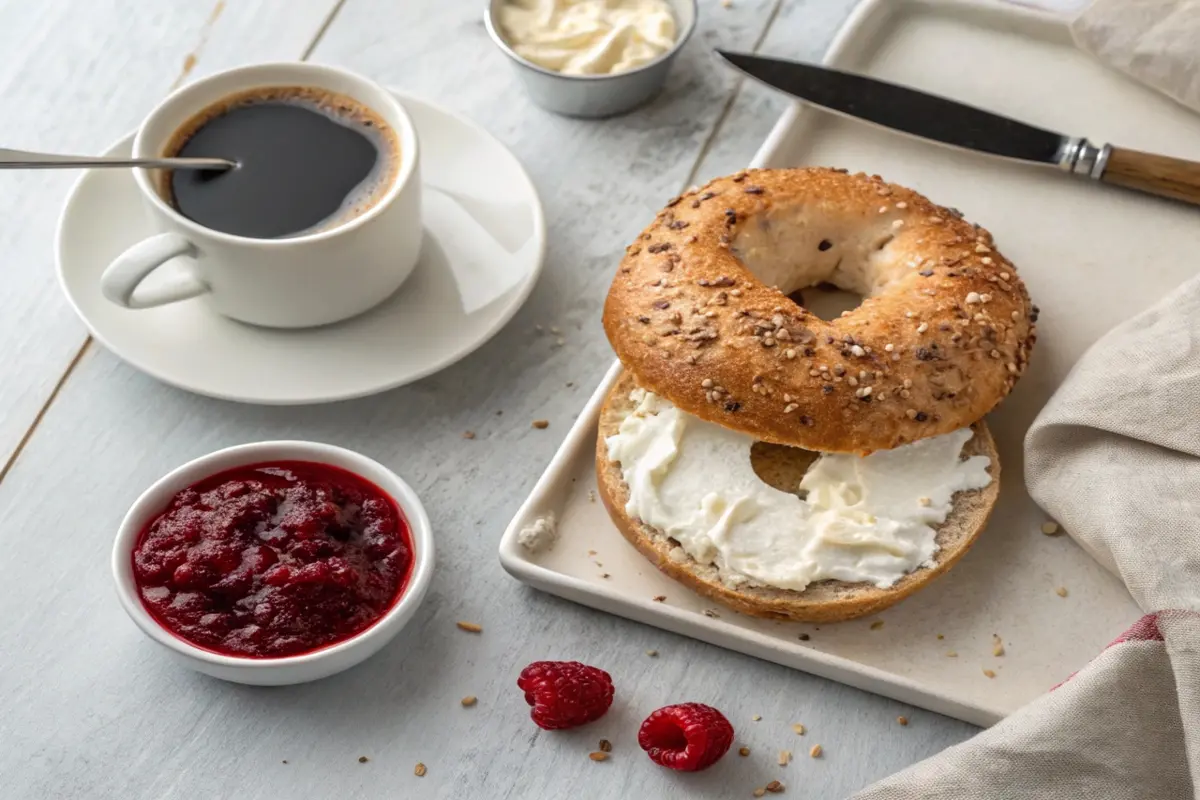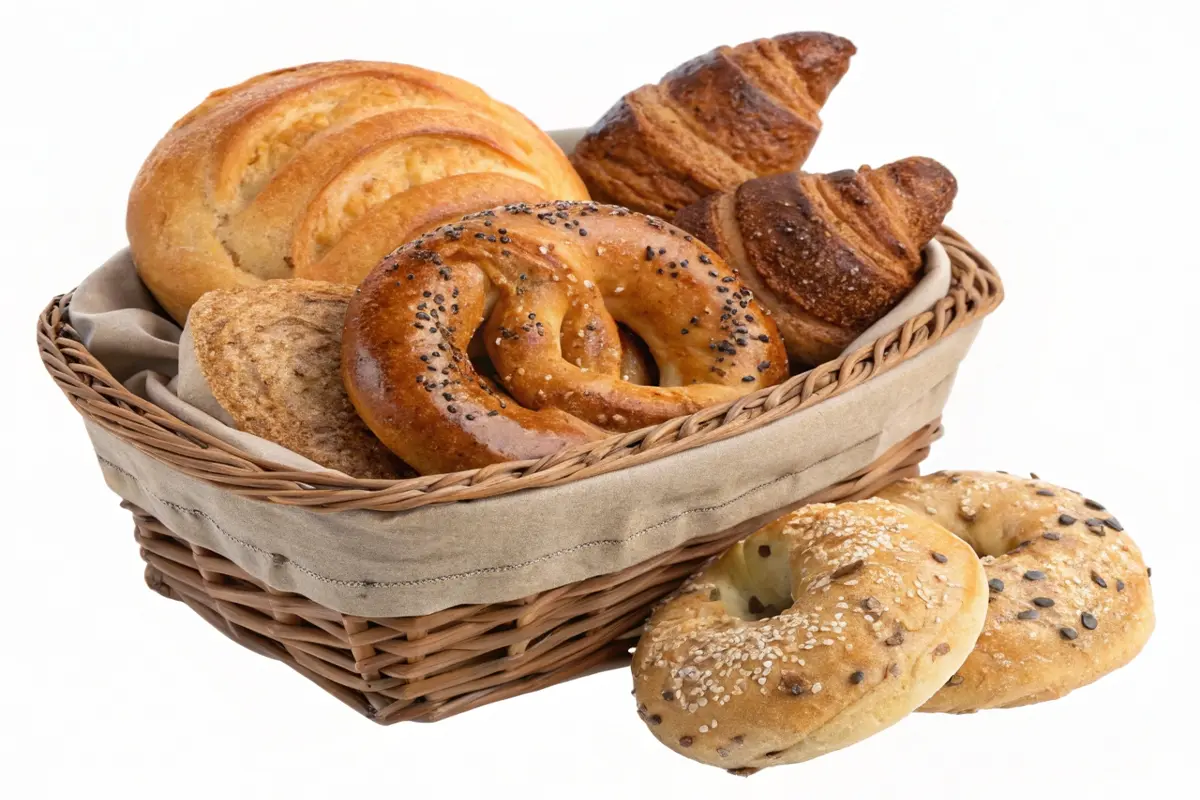When it comes to breakfast, are bagels the wholesome choice or do croissants take the crown? Let’s dig into the details to find out!
Understanding Bagels and Croissants
What Are Bagels? Ingredients and Preparation
Bagels are dense, round bread rolls with a hole in the center—practically a breakfast icon! They’re made using simple ingredients like flour, water, yeast, sugar, and salt. What makes them special, though, is how they’re cooked. Unlike other bread, bagels are boiled before baking. This gives them that unique chewy texture we all love.
Bagels come in many flavors, from plain and sesame to whole wheat and everything bagels. The toppings can vary, and they often serve as a blank canvas for spreads like cream cheese or butter. Yum, right?
“Bagels are like the reliable best friend of breakfast—they’re solid, versatile, and always satisfying.”
What Are Croissants? Ingredients and Preparation
Now, croissants? Oh, they’re the elegant cousins of bagels. Croissants are flaky pastries made using layers of dough and butter—a technique called laminating. This layering creates the buttery, crispy texture that makes croissants irresistible. They originated in France, but now you’ll find them worldwide.
Traditional croissants contain ingredients like flour, butter (lots of it!), sugar, milk, and yeast. Some variations include chocolate, almonds, or even savory fillings like ham and cheese. Imagine biting into that golden, buttery goodness—it’s an experience, isn’t it?

Nutritional Comparison of Bagels and Croissants
Let’s face it: health often comes down to numbers. So, how do bagels and croissants stack up nutritionally?
| Nutrient | Bagel (Plain, 100g) | Croissant (Butter, 100g) |
|---|---|---|
| Calories | 250 | 406 |
| Protein | 9g | 7g |
| Fat | 1.5g | 21g |
| Carbohydrates | 49g | 45g |
| Fiber | 2.5g | 1.2g |
| Sugar | 4.5g | 7g |
As you can see, bagels are lower in fat and calories compared to croissants. However, croissants win in the taste department for their rich, buttery flavor. It’s all about what you’re looking for—energy or indulgence.
Health Benefits of Bagels
Whole-Grain Bagels and Fiber Benefits
Choosing a whole-grain bagel? You’re in for a health boost. Whole-grain bagels are packed with fiber, which helps keep your digestive system in check. Fiber also makes you feel fuller for longer, which can be a game-changer if you’re trying to manage your weight.
Plus, fiber helps regulate blood sugar levels. So, if you’re someone who experiences sugar crashes, whole-grain bagels might be your new best friend.
Bagels and Energy Levels
Bagels are carb-heavy, which means they’re excellent for a quick energy boost. Planning a busy day? A bagel for breakfast can keep you fueled until lunchtime. Just be mindful of the toppings—adding protein, like peanut butter or smoked salmon, can make it even more satisfying.
“Bagels are like a gas station for your body—they refuel you fast and keep you going!”
Health Benefits of Croissants
The Role of Butter in Croissants
Okay, let’s talk butter. Yes, croissants are buttery—and that’s not necessarily a bad thing! Butter contains fats that our body needs for energy and cell function. Of course, moderation is key because too much saturated fat isn’t great for your heart.
Interestingly, croissants can be part of a balanced diet, especially if paired with healthy fillings like fresh veggies or lean protein. Think of it as a treat with a twist of health!
Croissants and Portion Control
One of the best things about croissants is that they’re portion-friendly. They’re smaller and lighter compared to a full bagel loaded with cream cheese. If you’re craving something indulgent without going overboard, a single croissant might be the perfect solution.

Common Misconceptions About Bagels and Croissants
Are Bagels Always Healthier?
It’s easy to think bagels are the healthier choice, but it depends on the type. A plain whole-grain bagel? Sure, pretty healthy. A giant bagel smothered in cream cheese? Not so much.
The healthiness of bagels often comes down to size and toppings. A bagel can easily top 400 calories if you’re not careful.
The Truth About Croissant Ingredients
Croissants get a bad rap because of their butter content, but not all fats are created equal. Butter provides fat-soluble vitamins like A and E. Plus, the key to enjoying croissants is balance—pairing them with a healthy lifestyle.
Factors to Consider for Healthier Choices
The Impact of Toppings and Fillings
Ah, toppings—the make-or-break factor for both bagels and croissants. Cream cheese, jelly, or butter on a bagel? That can add extra calories. Similarly, a chocolate-filled croissant is a calorie bomb compared to a plain one.
Portion Size: Finding the Balance
Portion control is your secret weapon. A smaller bagel or croissant can satisfy your cravings without overloading your plate. Cutting them in half and sharing might also do the trick!
Processing and Added Sugars
Processed bagels and croissants often have added sugars. Look for bakery-fresh options or make your own to control the sugar content. Trust me, homemade is worth it.
When to Choose Bagels Over Croissants
High-Energy Breakfast Options
If you’re looking for a breakfast that powers you through a hectic day, bagels are the way to go. Their higher carbohydrate content makes them an ideal source of energy, especially if you’re active. Athletes often opt for a bagel topped with peanut butter or an egg for a combination of carbs and protein to fuel their performance.
Bagels are also more customizable. Whether you want a savory option like avocado or a sweet one like honey, bagels are like a blank canvas. You can tailor them to fit your dietary needs and preferences.
Dietary Goals and Preferences
For individuals focused on heart health or reducing fat intake, bagels are generally a smarter choice. Whole-grain or multigrain varieties can contribute to your daily intake of whole grains, which are linked to improved cardiovascular health.
Are you on a low-fat diet? Bagels typically contain far less fat than croissants, especially if you skip the heavy spreads. They’re also dairy-free in their basic form, making them suitable for those with lactose intolerance.
When to Choose Croissants Over Bagels
A Balanced Treat or Indulgence
Let’s be real—sometimes, you just want to treat yourself. Croissants are perfect for those moments when taste takes precedence over calories. Their buttery layers are a sensory delight, and their smaller size can help you indulge without guilt.
Pair a croissant with a cup of coffee and fresh fruit for a luxurious yet balanced breakfast. It’s about quality over quantity.
Croissants in a Balanced Diet
Croissants may be rich in fat, but they can fit into a balanced diet. Pairing them with nutrient-dense foods like eggs, avocado, or a fresh salad can turn them into a more wholesome meal. The key is balance—think of croissants as the star of the plate, with healthier sides playing the supporting role.
“Croissants are like the dessert of breakfast—a little indulgence can go a long way in making your day brighter!”
Common Problems and Solutions in Choosing Between Bagels and Croissants
Struggling with Portion Sizes?
Both bagels and croissants can be calorie-dense, so portion control is crucial. If a whole bagel feels too much, try opting for a mini version. Similarly, choose smaller croissants instead of oversized ones to keep things manageable.
Cutting a bagel in half or sharing a croissant with a friend can also help. Remember, less is sometimes more when it comes to indulgence!
Confused About Nutrition Labels?
Understanding nutrition labels can feel like decoding a foreign language. Look for key information like serving size, calories, and added sugars. For bagels, prioritize options with whole grains and minimal sugar. For croissants, aim for those made with real butter and fewer additives.
Managing Food Cravings Effectively
Cravings can steer you toward choices that might not align with your health goals. If you’re craving a buttery croissant, balance it with a protein-rich side like eggs or Greek yogurt. For bagel lovers, adding veggies or lean protein can make your meal more satisfying and nutrient-dense.

Expert Tips for Healthier Choices
Reading Labels for Nutritional Value
When shopping for bagels, seek out varieties made with whole grains and avoid heavily processed options with added sugars or artificial preservatives. For croissants, look for bakery-made versions with simple, natural ingredients.
Making Your Bagels and Croissants Healthier
You don’t need to sacrifice taste for health. Here are some ways to elevate the nutritional profile of your bagels and croissants:
- Bagels: Spread almond butter, hummus, or avocado instead of cream cheese. Add protein like smoked salmon or turkey slices to make it a complete meal.
- Croissants: Pair with fresh fruit or top with scrambled eggs for a nutritious twist. Opt for whole-wheat croissants if available for a fiber boost.
“Healthy eating isn’t about deprivation; it’s about smart swaps and finding what works for you.”
Conclusion: Are Bagels Healthier Than Croissants?
So, are bagels healthier than croissants? The answer depends on your goals and preferences. Bagels are typically lower in fat and calories, making them a better choice for those prioritizing energy and whole grains. On the other hand, croissants are a more indulgent option, perfect for occasional treats or smaller portions.
In the end, the healthiest choice is the one that fits your lifestyle, tastes, and nutritional needs. Balance is everything—enjoy your bagels and croissants in moderation, and don’t forget to savor every bite.
FAQs
Are bagels or croissants better for weight loss?
Bagels, especially whole-grain ones, are generally better for weight loss due to their lower fat content and higher fiber. However, portion control is crucial for both.
Which is more filling: bagels or croissants?
Bagels tend to be more filling because they’re higher in carbs and fiber. Croissants, while rich in fat, may not keep you full as long.
Can you make bagels and croissants healthier?
Absolutely! Choose whole-grain bagels or smaller croissants and pair them with nutrient-dense toppings like avocado, smoked salmon, or fresh fruit.
Are whole-wheat croissants healthier than regular ones?
Yes, whole-wheat croissants offer more fiber and nutrients compared to regular ones, but they still contain butter, so moderation is key.
What are the best toppings for a healthy bagel?
Healthy options include hummus, avocado, nut butter, or lean proteins like turkey or salmon. Avoid heavy spreads like cream cheese.
Are croissants gluten-free?
Traditional croissants are not gluten-free as they are made with wheat flour. However, gluten-free options are available at specialty bakeries.
